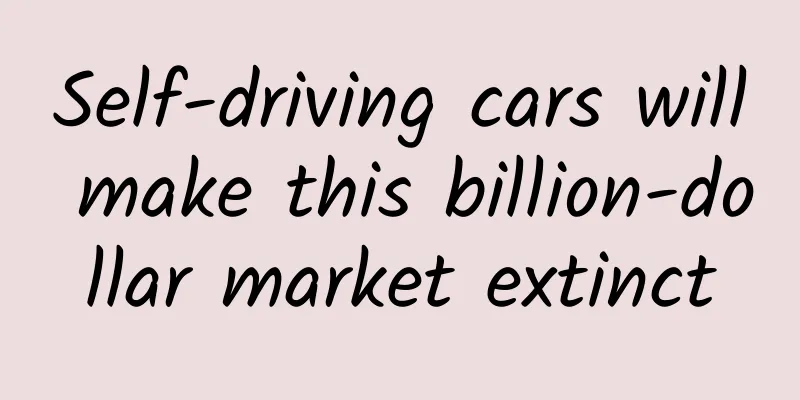Self-driving cars will make this billion-dollar market extinct

|
According to foreign media reports, in an interview in 2015, Tesla CEO Elon Musk pointed out that one day in the future, the development of driverless technology may make it illegal for humans to drive cars. Although some people may find this statement ridiculous, it may soon become a reality. Bain & Company said that by 2025, just a few years later, the market size of driverless cars is expected to reach 26 billion US dollars. Some even predict that by 2020, there will be 10 million driverless cars on the road. Musk predicts that human driving will become illegal, not only because the number of driverless vehicles is increasing, but also because they are so safe. It's hard to imagine that robots are safer than humans, but vehicle safety statistics show that human error is the number one cause of car accidents. In fact, in 2014 alone, more than 3,000 people were killed and 431,000 were injured in traffic accidents caused by distracted driving. The main causes were drivers using their phones while driving, driving while tired, driving recklessly, and running red lights. Self-driving cars face fewer variables and are more predictable in certain driving situations. Once self-driving cars are safe, it will have a huge impact on the automotive industry. In fact, it's not just the automotive industry that will be affected. Law enforcement, retail and service industries will all be changed. However, none of them will change as much as the insurance industry. Is car insurance still necessary in the driverless era? In theory, the absence of human error means fewer accidents and less need to insure drivers for damages they cause. Self-driving technology would significantly reduce the driver's liability for accidents, leading to a significant reduction in personal auto insurance premiums. Car insurance companies determine insurance rates based on individual driving history. New driverless technology turns drivers into passengers, and the responsibility for traffic accidents caused by driverless cars may be transferred to car manufacturers, software developers or transportation departments. "At present, many people believe that in the future, in traffic accidents involving driverless vehicles, car manufacturers will need to bear the responsibility," said Rick Gorvett of the Property and Casualty Actuarial Society. However, Michael Barry of Insurance Information Research does not think these changes will completely eliminate the responsibility of car owners. Barry pointed out that driver error is not the only threat to vehicles. Car owners and insurers must also consider other damage scenarios. "Cars may be flooded, damaged or stolen." He said, "But driverless technology will have a profound impact on the insurance industry. Many traditional insurance standards will be completely overturned." If something goes wrong, who is responsible? Damage like this is likely to make people pay more and more attention to service contracts that provide cosmetic and technical maintenance. Self-driving cars will require advanced technology to become a reality, and auto repair technicians will need to become IT experts, not just mechanical repairmen. Therefore, car owners who are used to repairing their own cars may have to think twice - handling these jobs will require new and complex diagnostic tools to identify and repair various technical faults. Although highly technical repair services are essential to ensure the functionality and safety of driverless cars, general maintenance, such as wheel alignment and tire replacement, is also essential. If some simple repairs like wheel alignment are not done properly, it may easily affect the steering adjustment calculation of the driverless car and ultimately pose a safety threat to the passengers. In theory, this could shift the responsibility to the driver. Scenarios like these must be taken into account when tailoring insurance policies for self-driving cars. “Obviously, the property and casualty insurance industry cannot be certain when autonomous vehicles will hit the road, how they will operate and what technology they will use,” said Michael Macauley, CEO of Quadrant Information Services. “However, insurers must assess the risk of (robot) vehicles being driven by different drivers in different cars in different road conditions and weather conditions.” As a winner of Toutiao's Qingyun Plan and Baijiahao's Bai+ Plan, the 2019 Baidu Digital Author of the Year, the Baijiahao's Most Popular Author in the Technology Field, the 2019 Sogou Technology and Culture Author, and the 2021 Baijiahao Quarterly Influential Creator, he has won many awards, including the 2013 Sohu Best Industry Media Person, the 2015 China New Media Entrepreneurship Competition Beijing Third Place, the 2015 Guangmang Experience Award, the 2015 China New Media Entrepreneurship Competition Finals Third Place, and the 2018 Baidu Dynamic Annual Powerful Celebrity. |
<<: 2020 Aion S launched: King of Evolution with more features but no price increase
>>: Tesla adjusts prices again: Model S and Model X drop by 8,000 yuan in China
Recommend
The friend who is still using an old-fashioned sewing machine to make patches may be a math genius
The old-fashioned pedal sewing machine should be ...
3 types of traffic thinking in e-commerce marketing!
By using our strengths and taking advantage of op...
BMW China is unable to remit profits from China, rumor refuted by many parties
I believe most people know that the profits of jo...
When Science Meets Doubt: The "Unbreakable Glass" of 1970
Glass is one of the most fascinating materials in...
Detailed usage of Motion Editor in Android Studio
In our communication with the Android developer c...
Aston Martin: Sales in China to plummet 49% in 2024
Recently, it was reported that, against the backdr...
[Pearl Science] A Scientific Look at Nano Pearl Powder
Nanomaterials refer to materials that have at lea...
Bantang Mengyi Advanced Writing Camp, build a writing money printing machine from 0 to 1, worth 5999 yuan
Bantang Mengyi Advanced Writing Camp, build a wri...
Many areas have seen adult paralysis "soft disease", which was eventually confirmed to be related to this
I have obviously gotten enough sleep and eaten en...
What exactly are user insights? How to do it?
I often hear people compare marketing to "te...
Why do mosquitoes always bite you? Because they want to date you!
Mixed Knowledge Specially designed to cure confus...
Soul advertising, Soul recommendation page advertising
In the marketing platform of Generation Z, traffi...
A review of the top 10 losers and winners of 2015: Lei Jun and Luo Yonghao are on the list
Now that 2015 has come to the past, this year, on...
Personal protection during the epidemic starts with this hand washing guide!
《Cotton Swab Medical Science Popularization》 Qi L...









